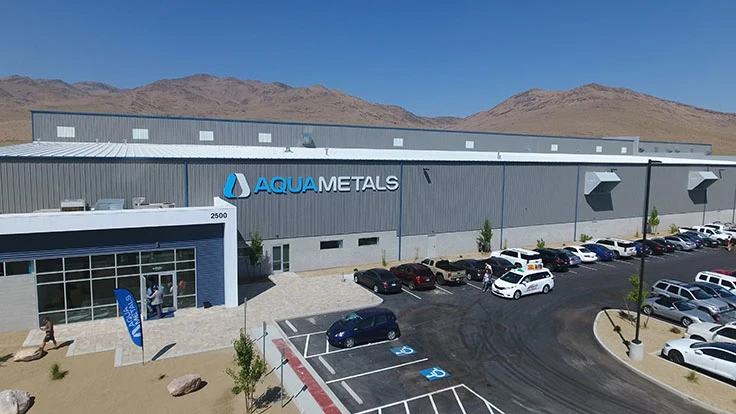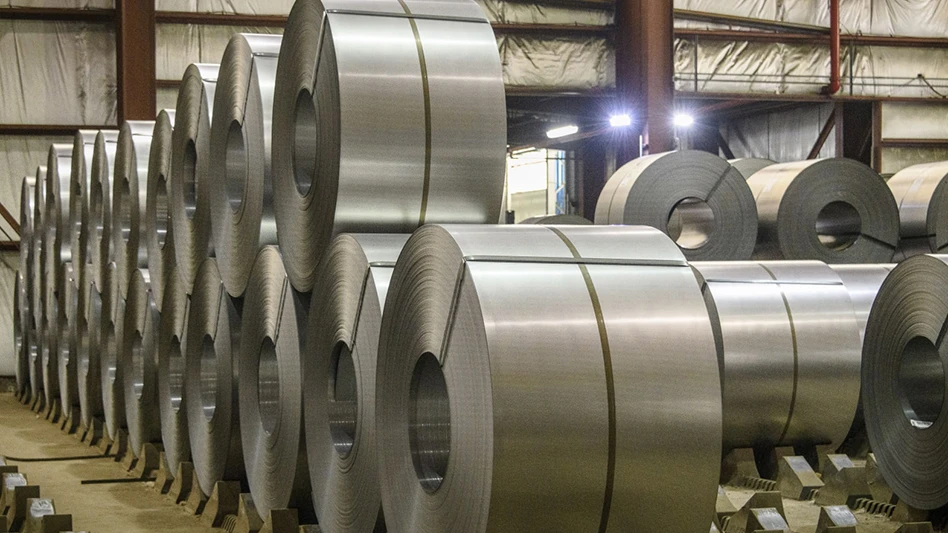
Aqua Metals Inc., Alameda, California, has opened its first lead-acid battery recycling facility at the Tahoe-Reno Industrial Center (TRIC) in McCarren, Nevada. The company says its AquaRefinery process is a nonpolluting electrochemical lead recycling technology.
“The first AquaRefinery at TRIC is an exciting start to a cleaner future for the lead industry,” said Stephen Clarke, CEO of Aqua Metals, at the open house. “Lead-acid batteries are over 99 percent recyclable, but until now, there has been no way to recycle lead in an environmentally friendly fashion. With this AquaRefinery and more expected to come, Aqua Metals is doing its part to create the most sustainable battery technology the world has ever seen while also providing economic benefits to recyclers, manufacturers and distributors.”
There are 16 AquaRefining modules in the TRIC facility. Each module is about 17 feet long, 4 feet high and 5.5 feet wide.
Through the AquaRefining technology Aqua Metals says it extracts lead from lead-acid batteries using a room temperature, closed-loop, water-based process that results in reductions of hazardous waste and direct human contact with the lead. The company says the process produces lead that is as pure as mined lead and requires no secondary processing.
The facility also is strategically located near an ample supply of used batteries. The battery manufacturing firm Battery Systems Inc. has a 200,000 square-foot battery distribution and collection facility adjacent to Aqua Metals’ TRIC facility.
According to Aqua Metals, Interstate Batteries, the largest battery recycler in the United States, made a $10 million investment in Aqua Metals and has committed to provide used lead-acid batteries to be recycled at Aqua Metals’ plant. Interstate Batteries controls more than 20 percent of the U.S. lead-acid battery recycling market.
Aqua Metals says the facility will initially be processing 80 metric tons of lead per day. The company adds that it has the potential to double its production capabilities to recycle 160 metric tons of lead per day by 2018.
The AquaRefinery was partially financed by a $10 million loan from Green Bank, which was 90 percent guaranteed by the U.S. Department of Agriculture. The facility also was financed by a $36.2 million initial public offering in July 2015.
Looking into the future, Aqua Metals says that while it will operate the first AquaRefinery, it plans to sell licenses to partners for its AquaRefining technology and equipment, which can be co-located with battery manufacturers and distributors, as well as existing battery recycling facilities globally.
“This first-ever AquaRefinery has the potential to change our industry and our planet,” says Scott Miller, president and CEO of Interstate Batteries. “While we’ve been in the battery business for more than six decades, Interstate continues to seek out innovation and invest in technology for today and tomorrow. Because Aqua Metals’ breakthrough technology is so promising, Interstate Batteries is supplying more than a million automotive and other lead-acid batteries to the AquaRefinery over the next year. We feel we’re making a smart investment in our future, and in the future of our industry.”
“Upon the opening of the AquaRefinery, our batteries will be recycled close to home,” says Brad Streelman, president and CEO of Battery Systems. “As the AquaRefinery is adjacent to our location at the Tahoe-Reno Industrial Center, we will be able to distribute, recover and recycle our high quality lead-acid batteries without transportation waste or supply chain complexity. The AquaRefining technology will make it possible for lead recycling facilities to be close to, or even co-located with, battery manufacturers and distributors – filling a significant gap in the industry.”
Latest from Recycling Today
- BlueScope, BHP & Rio Tinto select site for electric smelting furnace pilot plant
- Magnomer joins Canada Plastics Pact
- Out of touch with reality
- Electra names new CFO
- WM of Pennsylvania awarded RNG vehicle funding
- Nucor receives West Virginia funding assist
- Ferrous market ends 2024 in familiar rut
- Aqua Metals secures $1.5M loan, reports operational strides





